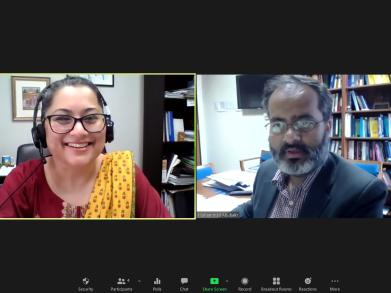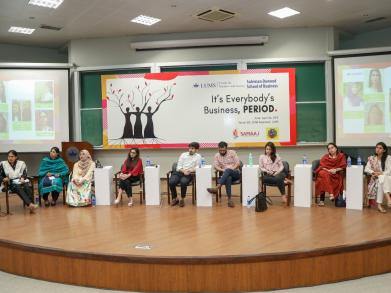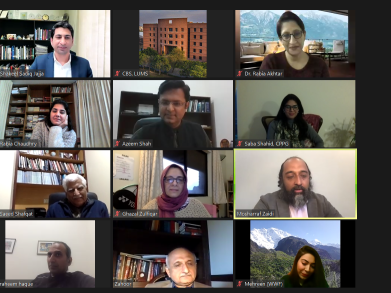CBS' legacy centre, the Social Enterprise Development Centre (SEDC) organized the second International Conference on Gender Work and Society (ICGWS) titled “Gender, Work and Leadership: Bringing Together Feminist and Postcolonial Insights” on April 27 and 28, 2019.
Given a large number of paper submissions (120+), the conference programme was fully packed with number of parallel sessions taking place over the two days. Under the SEDC Directorship of Dr. Faiza Ali, the conference provided a platform for the academic scholars to analyze, critique and deconstruct recent trends, innovations and conditions related to gender, work and society. The conference was organized by the SEDC, which has worked on gender mainstreaming in Pakistan’s development sector since 2001. Through this conference, SEDC-LUMS provided a common platform for scholars, civil society, policymakers, journalists and industry specialists to discuss as many aspects of gender-equality in Pakistan and beyond, as possible.
The conference brought together a diverse and interdisciplinary range of perspectives, from participants/academics drawn from all over Pakistan and across different countries. A conscious effort was made to ensure higher participation by women researchers and to be receptive to women’s voices, which was reflected by the exceptionally large number of female participants. The focus of the conference was on exploring the link between various gender categories and economic participation. The conference specifically probed the impact of globalization, social movements and social norms on economic participation of various gender categories. Important issues relating to violence and workplace harassment were explored, in context of the phenomenal #MeToo movement. Many presenters highlighted the issues faced by researchers working in the field of gender. The conference also encompassed the oft-neglected gender-related debates revolving around ‘masculinity’ and ‘queer identities’. There was a unanimous consensus on the need for engendering research work in the area of ‘gender equality’ and removing the obstacles which hinder women’s participation and safety at the workplace.
Dr. Faiza Ali, Director SEDC, welcomed all participants and invited Chief Guest, Syeda Henna Babar Ali, who talked about case study of Packages in terms of accommodating female needs at workplace. LUMS Faculty members in particular from Suleman Dawood School of Business and Mushtaq Ahmad Gurmani School of Humanities and Social Sciences participated as participants and session chairs.
The Keynote speaker, Professor Mustafa F. Ozbilgin, from the Brunel University, London, shared his seminal work on ‘Atypical Leadership’. He took a ‘gendered’ view of his research work and explained how women, as atypical leaders in the workplace, legitimize and delegitimize diversity. SDSB’s Dean, Dr. Alnoor Bhimani shared his insights on gender and diversity to the audience at the closing ceremony and distributed best paper awards. Ms. Shermeen Bano, from the University of Management and Technology, Lahore, won the ‘Best Paper’ award for her paper titled ‘Mobility and Syndemic Vulnerability to HIV Acquisition in Khwaja Sira Sex Workers in Lahore’. Ms. Ayra Indrias Patras, from the University of Punjab, was declared 1st runner-up for her research work titled ‘The Untold Sufferings of Subalterns: A case study of Christian female sweepers in Lahore’. While, Dr. Amani Moazzam and Zoya Faisal, from the University of Punjab got the 2nd runner-up award for their work titled ‘Stigmatization of flexible work arrangements: A gendered perspective of higher education institutions’.
The conference sessions/discussions evolved around the following themes:
• Gender and Entrepreneurship in the Asian Context
• Gender Equality and Sustainable Development
• Sexual Harassment at the Workplace, Particularly in Context of #MeToo
• Gender, Class and Social Movements
• Gender Empowerment and Informal Economy
• Gender, Leadership and Organization
• Gendered Intersections: Culture, Ethnicity, Class and Religion in the Workplace
• Masculinity & Queer Identities at Workplaces
• Violence and Harassment at Workplace #MeToo
• Education and Employment - Connecting the Missing dots
Detailed conference programme/schedule can be downloaded below.
















